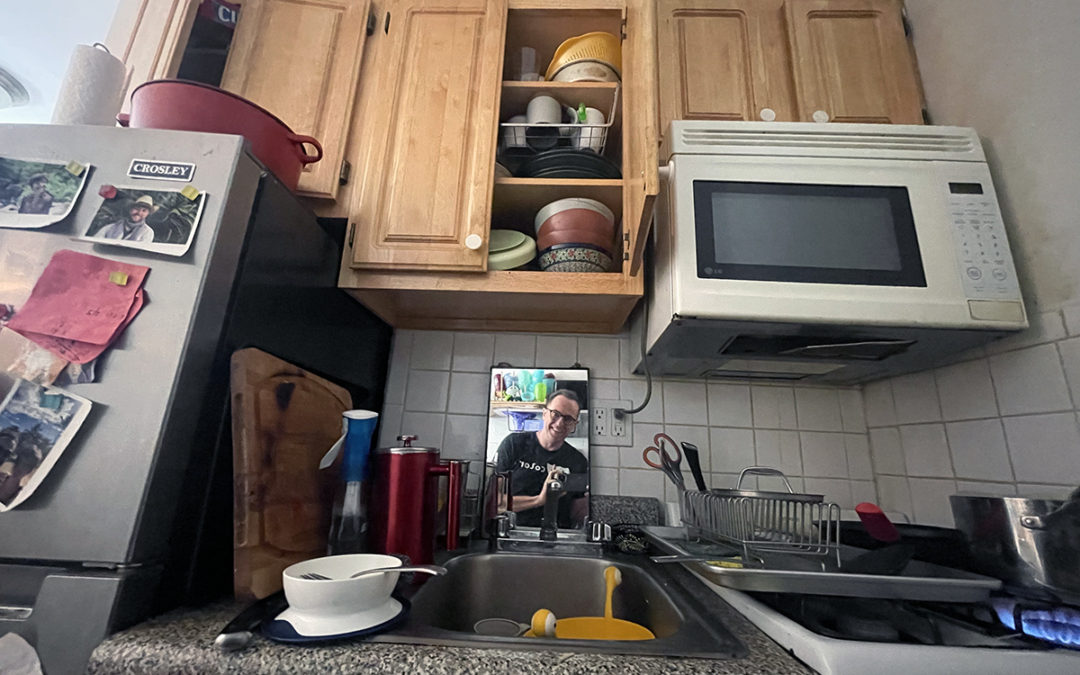As I was cooking pasta for my wife and son on Sunday lunchtime, I pulled out the iPhone. I shot our kitchen in its entirety. You can see my face in the mirror under the sink. In no way do I mind these cramped conditions. My wife, on the other hand, does mind them. We live in this apartment because I barraged her with every single persuasive technique in my arsenal. She was two months pregnant when we moved in, and we were leaving behind a fifth-floor walk-up. I had leverage.
Apart from the obvious narcissism of showing you our kitchen, why am I doing it? Well, it turns out, narcissism is the main reason. We moved in here because Mick Jagger used to own a house three doors up the street. Living here is the closest I will ever get to Sir Mick. And that’s enough for me, because even living in a shoebox, narcissism is my main motivation as a consumer. I learned this when I took a course in “advanced selling techniques” 15 years ago.
The trainer asked me what my budget was for buying a vacation. Then he asked me a bunch of questions. Then some more. Then some more. I wanted to go surfing somewhere hot. You know. Then one more. He asked, “If there was one thing you could have in this vacation that would make it awesome, what would it be?”
“I’d like to be able to take pictures to put on Facebook to make me look cool to my friends,” I said.
And what would be my budget if he could deliver me a vacation like that?
“Pretty much limitless,” I said. Then I may have blushed a bit.
That was the breakthrough. The reason most people think they buy things is not the actual reason they buy things. So, if you want to understand your customer or audience, let alone “sell” (I know, it’s a vulgar word, we all hate it, but it is what it is, and in my experience one only calls selling ‘business development’ when the invoices have at least four zeroes…in the world of fundraising, my experience is that one still calls it that until you enter the world of the “Jeffersonian dinner”, and then, the bets are off)…to them, then it helps to ask a lot more questions than you’d expect. I also always ask the one last question, as the trainer taught me. And I listen hard for what it tells me about the client’s needs.
Academic researchers have done more work on consumer motivation. To cut through the noise, cause-driven organizations need to think more like brands on this score. People buy things for “normative” motivations like ethics and social acceptance. They want to act in accordance with their principles, and make a good impression on their peers. They engage with causes for the same reasons. But people also buy things for “hedonic” reasons, the researchers say. Things like pleasure and stimulation, and “to avoid dullness.” How many of us are thinking like that about our audiences in the cause-driven space?
I would argue: Far too few. Although if you go to enough big ticket fundraising events, you tend to find the people who are thinking like this are bringing in the biggest checks. Harry Styles just donated the proceeds of his new Apple commercial to the International Rescue Committee. Kudos to the person who did the persuasion. I hope it was fun.
Do you know what your real, deeper reasons are for making big decisions? What about those of your audiences? I’ve spent a lifetime trying to overcome my purchasing narcissism. But the closest I’ve got is awareness. And, I do really love this apartment. Still, I’m glad I’ve got that far, to the awareness stage, because at least when one has insight, one can attempt to course-correct. Meantime, please, come round for dinner. You’ll need to balance the food on your lap because we don’t have room for a dining table. 🤷


